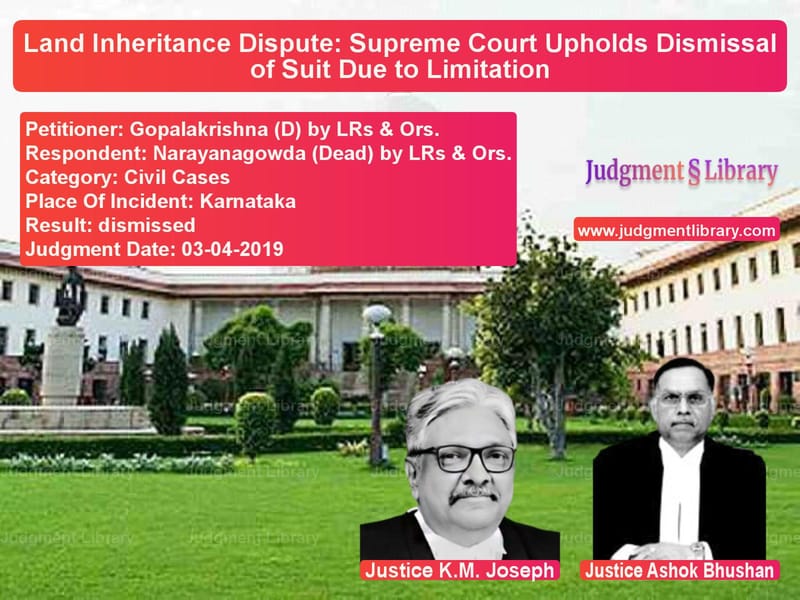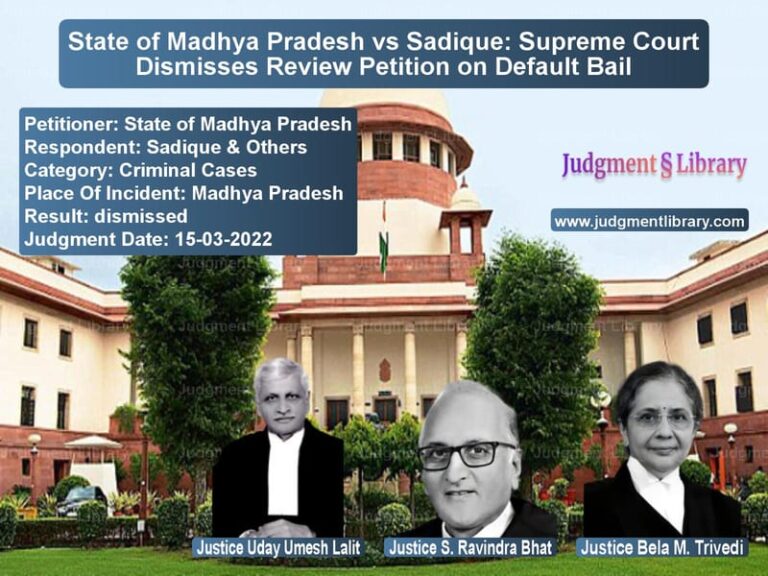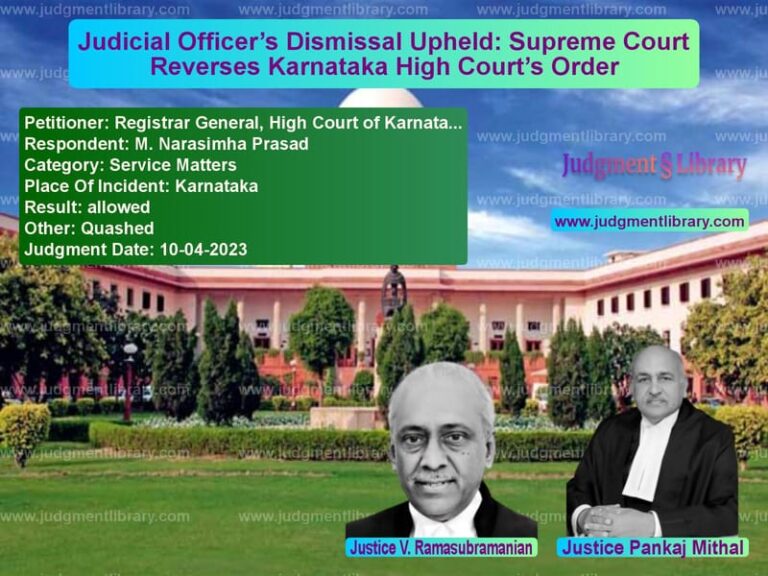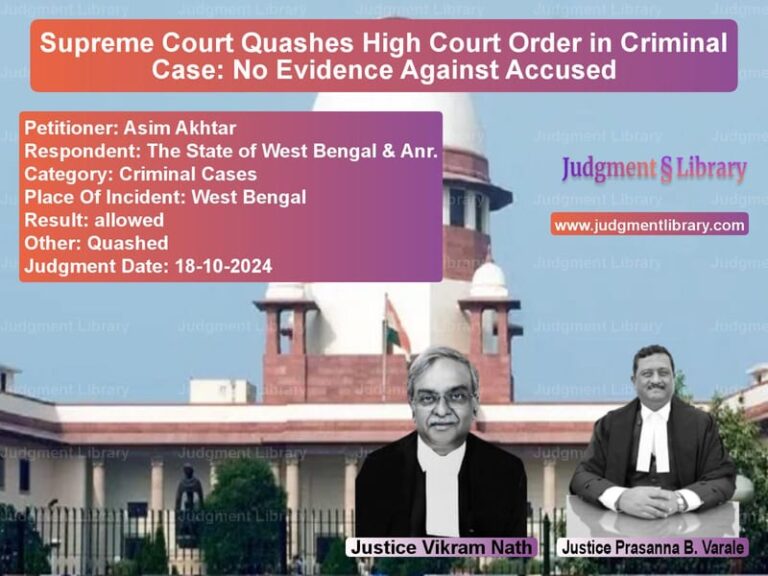Land Inheritance Dispute: Supreme Court Upholds Dismissal of Suit Due to Limitation
The Supreme Court of India, in a landmark decision, dismissed an appeal concerning a decades-old land inheritance dispute, citing the expiry of the limitation period. The case involved a legal battle over ancestral property, questioning the rights of a widow, daughter, and granddaughter under the Hindu law of inheritance.
Background of the Case
The case revolves around the inheritance rights of the descendants of Ramanna, who passed away in 1907. He was survived by his second wife, Seethamma, while his first wife predeceased him. Ramanna had a daughter, Venkamma, from his first wife, who passed away in 1910. The key dispute was whether Venkamma’s daughter, Jankamma, had legal rights to inherit the property after Ramanna’s death.
In 1955, Jankamma sold the disputed property to the appellants. However, the respondents, who claimed ownership through a different sale deed executed by Seethamma in favor of her brother Srinivasa Rao in 1913, challenged their title. The respondents had been in possession of the land since 1954 under a registered sale deed.
The appellants filed two suits (O.S. No. 68/1985 and O.S. No. 21/1986) for declaration of title, recovery of possession, and mesne profits. The trial court ruled in their favor, declaring them as rightful owners. However, the first appellate court reversed this decision, holding that the respondents had perfected their title through adverse possession, and the suits were barred by limitation. The High Court upheld this verdict, prompting the appellants to approach the Supreme Court.
Arguments Before the Supreme Court
Appellants’ Contentions:
- The appellants argued that Venkamma survived her father, Ramanna, making her the rightful heir. Therefore, upon her death in 1910, the property should have passed to her daughter, Jankamma.
- As per Section 10(2)(g) of the Mysore Hindu Law Women’s Right to Property Act, 1933 (State Act), a widow could not claim absolute ownership if the deceased had a surviving daughter or daughter’s son.
- The sale executed by Seethamma in favor of her brother was illegal because she had only a limited widow’s estate, which reverted to the reversioners upon her death.
- The appellants contended that the limitation period should not bar their suit since they derived title through a valid sale from Jankamma in 1955.
Respondents’ Counterarguments:
- The respondents challenged the existence of Venkamma’s daughter, Jankamma, and denied that she had any legal ownership of the property.
- They argued that Seethamma’s sale to her brother in 1913 was valid and that they had legally acquired the land through subsequent transactions.
- The respondents asserted that even if the appellants had a legitimate claim, they failed to assert their rights within the legally prescribed period, making their suit time-barred.
- Their possession of the land since 1954 under a registered sale deed granted them ownership rights through adverse possession.
Supreme Court’s Findings
The Supreme Court upheld the decision of the lower courts and ruled that:
- As per Section 10(2)(g) of the Mysore Hindu Law Women’s Right to Property Act, Seethamma had only a limited widow’s estate. Upon her death in 1938, the property would revert to the reversioners, if any.
- Jankamma, being the granddaughter of Ramanna, could have claimed the property as a reversioner. However, she did not challenge Seethamma’s sale within the prescribed limitation period.
- Under the Indian Limitation Act, 1908, a reversioner must file a suit for possession within 12 years from the death of the widow (i.e., by 1950). Since no such claim was made, the right to recover possession was extinguished.
- Even if the appellants acquired the property through a sale deed in 1955, they had to file their suit within 12 years, i.e., by 1967. Since they filed their suit only in 1985 and 1986, it was clearly time-barred.
- Once the limitation period expired, the appellants’ claim to ownership ceased, making their title unenforceable.
The Supreme Court cited past precedents to reinforce its ruling:
“The right of reversionary heirs is in the nature of spes successionis, and as the reversioners do not trace their title through or from the widow, it would be manifestly unjust if they are to lose their rights simply because the widow has suffered the property to be destroyed by the adverse possession of a stranger.”
The Court concluded that the respondents’ continuous possession since 1954, combined with the appellants’ failure to act within the limitation period, established their title through adverse possession.
Final Judgment
The Supreme Court dismissed the appeal, stating:
“In such circumstances, we see no reason to interfere with the judgment of the High Court. The appeals will stand dismissed with no order as to costs.”
Conclusion
The judgment reiterates the fundamental principle that property claims must be asserted within the prescribed limitation period. It also clarifies the inheritance rights of Hindu widows, daughters, and granddaughters under pre-independence Hindu law. The case serves as a reminder of the importance of timely legal action in property disputes to prevent the loss of rights through adverse possession.
Petitioner Name: Gopalakrishna (D) by LRs & Ors..Respondent Name: Narayanagowda (Dead) by LRs & Ors..Judgment By: Justice K.M. Joseph, Justice Ashok Bhushan.Place Of Incident: Karnataka.Judgment Date: 03-04-2019.
Don’t miss out on the full details! Download the complete judgment in PDF format below and gain valuable insights instantly!
Download Judgment: Gopalakrishna (D) by vs Narayanagowda (Dead) Supreme Court of India Judgment Dated 03-04-2019.pdf
Direct Downlaod Judgment: Direct downlaod this Judgment
See all petitions in Property Disputes
See all petitions in Succession and Wills
See all petitions in Landlord-Tenant Disputes
See all petitions in Judgment by K.M. Joseph
See all petitions in Judgment by Ashok Bhushan
See all petitions in dismissed
See all petitions in supreme court of India judgments April 2019
See all petitions in 2019 judgments
See all posts in Civil Cases Category
See all allowed petitions in Civil Cases Category
See all Dismissed petitions in Civil Cases Category
See all partially allowed petitions in Civil Cases Category







